
Roseanne Cherrie Barr is an American actress, comedian, writer, and producer. She began her career in stand-up comedy before gaining acclaim in the television sitcom Roseanne. She won an Emmy and a Golden Globe Award for Best Actress for her work on the show.

Jerome Allen Seinfeld is an American stand-up comedian, actor, writer, and producer. From 1989 to 1998, he played a semi-fictionalized version of himself in the sitcom Seinfeld, which he created and wrote with Larry David. The show aired on NBC from 1989 until 1998, becoming one of the most acclaimed and popular sitcoms of all time. As a stand-up comedian, Seinfeld specializes in observational comedy. In 2004, Comedy Central named him the 12th-greatest stand-up comedian of all time.

The Larry Sanders Show is an American television sitcom set in the office and studio of a fictional late-night talk show. The series was created by Garry Shandling and Dennis Klein and aired from August 15, 1992, to May 31, 1998, on the HBO cable television network.
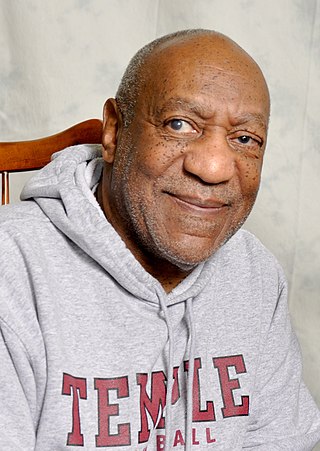
William Henry Cosby Jr. is an American former comedian, actor, spokesman, and media personality. Cosby gained a reputation as "America's Dad" for his portrayal of Cliff Huxtable on The Cosby Show (1984–1992). He has received numerous awards and honorary degrees throughout his career, many of which were revoked following sexual assault allegations made against him in 2014.

Everybody Loves Raymond is an American television sitcom created by Philip Rosenthal that aired on CBS from September 13, 1996, to May 16, 2005, with a total of 210 episodes spanning nine seasons. It was produced by Where's Lunch and Worldwide Pants Incorporated, in association with HBO Independent Productions. The cast members were Ray Romano, Patricia Heaton, Brad Garrett, Doris Roberts, Peter Boyle, Madylin Sweeten, and Monica Horan. Most episodes of the nine-season series were filmed in front of a live studio audience.

Phyllis Ada Diller was an American stand-up comedian, actress, author, musician, and visual artist, best known for her eccentric stage persona, self-deprecating humor, wild hair and clothes, and exaggerated, cackling laugh.
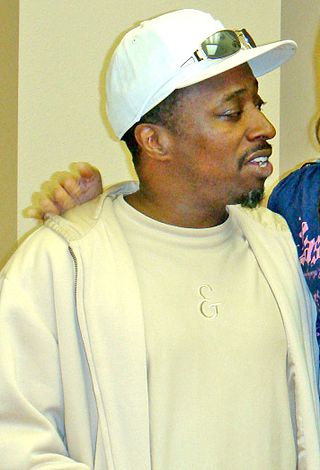
Edward Rubin Griffin is an American stand-up comedian and actor. He is best known for portraying Eddie Sherman in the sitcom Malcolm & Eddie, the title character in the 2002 comedy film Undercover Brother, and Tiberius Jefferson "T.J." Hicks in Deuce Bigalow: Male Gigolo (1999) and Deuce Bigalow: European Gigolo (2005). He also portrayed Orpheus in Scary Movie 3 (2003) and voiced Richard Pryor on Black Dynamite (2012–2015). He is also known for his role as Pope Sweet Jesus in the movie Norbit (2007). Griffin was ranked at number 62 on Comedy Central's list of the 100 Greatest Stand-ups of All Time.

Gadjah Mada University is a public research university located in Sleman, Special Region of Yogyakarta, Indonesia. Officially founded on 19 December 1949, Gadjah Mada University is one of the oldest and largest institutions of higher education in the country, and has been credited as one of the best universities in Indonesia. In the 2023 QS World Universities Ranking, UGM is ranked 1st in Indonesia and 231st in the world.
"The Seinfeld Chronicles" is the pilot episode of the American sitcom Seinfeld, which first aired on NBC on July 5, 1989.
American humor refers collectively to the conventions and common threads that tie together humor in the United States. It is often defined in comparison to the humor of another country – for example, how it is different from British humor and Canadian humor. It is, however, difficult to say what makes a particular type or subject of humor particularly American. Humor usually concerns aspects of American culture, and depends on the historical and current development of the country's culture. The extent to which an individual will personally find something humorous obviously depends on a host of absolute and relative variables, including, but not limited to geographical location, culture, maturity, level of education, and context. People of different countries will therefore find different situations funny. Just as American culture has many aspects which differ from other nations, these cultural differences may be a barrier to how humor translates to other countries.

Carol Leifer is an American comedian, writer and producer whose career as a stand-up comedian started in the 1970s when she was in college. She has written many television scripts including The Larry Sanders Show, Saturday Night Live and Seinfeld. She has received four Primetime Emmy Award nominations for The Larry Sanders Show, Seinfeld, the 82nd Academy Awards and the 84th Academy Awards. Leifer's inner-monologue driven, observational style is often autobiographical, encompassing subjects about her Jewish ancestry and upbringing, coming out, same-sex marriage, relationships and parenting.
"The English Patient" is the 151st episode of the NBC sitcom Seinfeld. It was the 17th episode for the eighth season and aired on March 13, 1997. The English Patient, central to Elaine's storyline in this episode, won Best Picture at the 69th Academy Awards, eleven days after this episode aired.
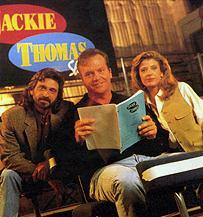
The Jackie Thomas Show is an American sitcom that aired on the ABC network from December 1992 to March 1993. The series received widespread attention due to its creators Roseanne Arnold, then starring in the fifth season of her comedy Roseanne, and her then-husband and Roseanne co-producer Tom Arnold. The Jackie Thomas Show starred Tom Arnold as a misanthropic sitcom actor.
Indonesian Ulema Council is Indonesia's top Islamic scholars' body. MUI was founded in Jakarta on July 26, 1975 during the New Order era. The council comprises many Indonesian Muslim groups including Nahdlatul Ulama (NU), Muhammadiyah, and smaller groups such as LDII, Syarikat Islam, Perti, Al Washliyah, Mathla'ul Anwar, GUPPI, PTDI, DMI, and Al Ittihadiyyah. The Ahlul Bait Indonesia (Shi'ite) and Jemaat Ahmadiyyah Indonesia (Ahmadiyya) were not accepted as members.

Cristela Alonzo is an American actress, stand-up comedian, writer, and producer, who created and starred in the ABC sitcom Cristela. This made Alonzo the first Mexican American woman to create, produce, write, and star in her own US primetime comedy.

Bill Cosby 77 is an unreleased 2014 stand-up comedy film featuring Bill Cosby, filmed before a live audience at the San Francisco Jazz Center in California. Cosby chose the venue in honor of his friend Enrico Banducci and his establishment the hungry i. The comedian said his wife Camille Cosby helped with the editing process of the film.
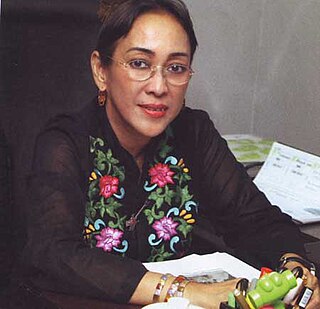
Diah Mutiara Sukmawati Sukarnoputri is the third daughter of Indonesia’s founding president Sukarno and his wife Fatmawati. Sukmawati is the younger sister of former Indonesian president Megawati Sukarnoputri and politician Rachmawati Sukarnoputri.

Abuya Kyai Hajji Ahmad Muhtadi bin Dimyathi al-Bantani or better known as Abuya Muhtadi is an Indonesian Muslim cleric from Banten. He is known as one of the Muslim scholars close to President Joko Widodo. At the Zikir Kebangsaan which was first held by the Indonesian government in the Merdeka Palace in 2017, Muhtadi was one of the religious leaders invited by the president. In the 2019 Indonesian presidential election, he supported a friend who was also a Muslim cleric from Banten, Ma'ruf Amin, who became the running mate of incumbent presidential candidate, Joko Widodo. Even so, in the 2014 Indonesian presidential election, he supported Prabowo Subianto as a candidate for Indonesian President and instructed his students to vote for Subianto.

Feminism in Indonesia refers to the long history of discourse for gender equality to bring about positive social change in Indonesia. The issues women in Indonesia currently are facing include gender violence, underage marriages, and lack of representation in the political system. Feminism and the women's right movement began during colonial Indonesia under Dutch rule and were spearheaded by the national heroine Kartini, a Javanese noblewoman who advocated for the education of all women and girls regardless of social status. In the early 19th century, women's rights organizations and movements were allowed to developed under Budi Utomo, the first Indonesian Nationalist organization. Modern day Indonesian feminism include and are influenced by both fundamentalist and progressive Islamic women's organizations.
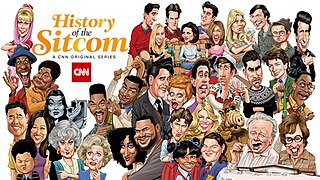
History of the Sitcom is an eight-part CNN documentary television series that traces the development of the American situation comedy show from the 1950s to the 21st Century. The show features 184 interviews with creatives, actors and directors including Norman Lear, Mel Brooks, Yvette Lee Bowser, Marta Kauffman, and Carl Reiner. The series follows a similar format of the CNN Original Series The History of Comedy.
















